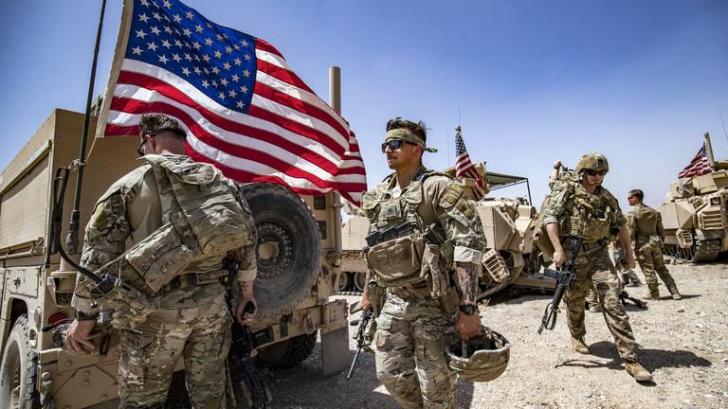News / National
Zambia does not need US military presence - MP
24 Jun 2024 at 12:29hrs |
0 Views

© Delil SOULEIMAN/AFP
Zambia has no need for a US military presence, Stephen Kampyongo, a member of the southern African country's National Assembly, told RT in an exclusive interview, questioning the relevance of security cooperation between Washington and Lusaka.
The opposition Patriotic Front MP made the statement in response to regional concerns about the continued presence of US Africa Command (AFRICOM) forces in Zambia and demands from lawmakers for their withdrawal.
Speaking to RT on Saturday, Kampyongo said AFRICOM's objectives in the country are "not well spelled out," which has sparked fears in both Zambia and its southern African neighbors, including Zimbabwe.
In April 2022, Washington announced the launch of the Office of Security Cooperation by AFRICOM at the US Embassy in Zambia's capital, Lusaka. The move, according to the US government, aimed to improve "military-to-military relations" and expand areas of cooperation in force management, modernization, and professional military education for the Zambian security forces.
The move has faced widespread opposition despite the government repeatedly insisting that the center's sole purpose is to train national troops for UN missions.
Brian Muntayalwa Mundubile, another Patriotic Front MP, previously accused the Zambian government of failing to consult with Southern African Development Community (SADC) member states before signing an agreement with AFRICOM.
Zimbabwe, a SADC member, has expressed concern about Washington's policy ambitions in Zambia. During a meeting on the sidelines of the St. Petersburg International Economic Forum earlier this month, Zimbabwean President Emmerson Mnangagwa told his Russian counterpart, Vladimir Putin, that the US is attempting to consolidate its forces in Zambia from a "security point of view and from the point of financial support for Zambia."
On Thursday, Zambian lawmakers reportedly demanded accountability from the government in dealing with regional concerns, warning that hosting AFRICOM forces could strain relations with neighbors.
Kampyongo told Zambia's foreign affairs minister, Mulambo Haimbe, during a parliamentary session that other members of the 16-state SADC bloc "may be quiet, but they share the same concerns as Zimbabwe."
"It's not desirable for… the United States... to impose an international request on us," Kampyongo later said in response to a question from RT about whether he believes Washington is trying to impose its policies on Zambia's government.
"Any international policy must be premised on mutual respect, appreciating the sovereignty of each state," he added.
South Africa, Libya, and Nigeria have previously opposed the establishment of AFRICOM in Africa, fearing that Washington intends to expand its influence on the continent and prioritize protecting oil interests.
In recent years, the US has experienced setbacks in its military operations in Africa. American troops in Niger are scheduled to leave by mid-September after the West African country's military government terminated a security agreement. The Pentagon also announced the withdrawal of forces from Chad amid uncertainty about whether Washington's status of forces agreement with the Central African country can be extended or renegotiated.
The opposition Patriotic Front MP made the statement in response to regional concerns about the continued presence of US Africa Command (AFRICOM) forces in Zambia and demands from lawmakers for their withdrawal.
Speaking to RT on Saturday, Kampyongo said AFRICOM's objectives in the country are "not well spelled out," which has sparked fears in both Zambia and its southern African neighbors, including Zimbabwe.
In April 2022, Washington announced the launch of the Office of Security Cooperation by AFRICOM at the US Embassy in Zambia's capital, Lusaka. The move, according to the US government, aimed to improve "military-to-military relations" and expand areas of cooperation in force management, modernization, and professional military education for the Zambian security forces.
The move has faced widespread opposition despite the government repeatedly insisting that the center's sole purpose is to train national troops for UN missions.
Brian Muntayalwa Mundubile, another Patriotic Front MP, previously accused the Zambian government of failing to consult with Southern African Development Community (SADC) member states before signing an agreement with AFRICOM.
Zimbabwe, a SADC member, has expressed concern about Washington's policy ambitions in Zambia. During a meeting on the sidelines of the St. Petersburg International Economic Forum earlier this month, Zimbabwean President Emmerson Mnangagwa told his Russian counterpart, Vladimir Putin, that the US is attempting to consolidate its forces in Zambia from a "security point of view and from the point of financial support for Zambia."
On Thursday, Zambian lawmakers reportedly demanded accountability from the government in dealing with regional concerns, warning that hosting AFRICOM forces could strain relations with neighbors.
Kampyongo told Zambia's foreign affairs minister, Mulambo Haimbe, during a parliamentary session that other members of the 16-state SADC bloc "may be quiet, but they share the same concerns as Zimbabwe."
"It's not desirable for… the United States... to impose an international request on us," Kampyongo later said in response to a question from RT about whether he believes Washington is trying to impose its policies on Zambia's government.
"Any international policy must be premised on mutual respect, appreciating the sovereignty of each state," he added.
South Africa, Libya, and Nigeria have previously opposed the establishment of AFRICOM in Africa, fearing that Washington intends to expand its influence on the continent and prioritize protecting oil interests.
In recent years, the US has experienced setbacks in its military operations in Africa. American troops in Niger are scheduled to leave by mid-September after the West African country's military government terminated a security agreement. The Pentagon also announced the withdrawal of forces from Chad amid uncertainty about whether Washington's status of forces agreement with the Central African country can be extended or renegotiated.
Source - RT
Join the discussion
Loading comments…




























